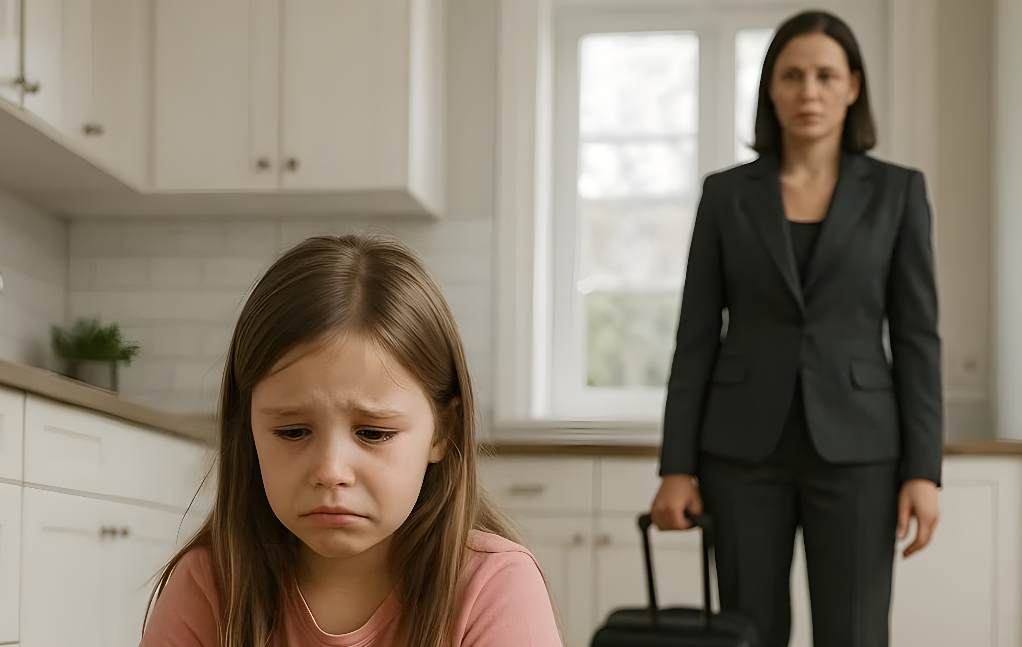After traveling, we checked into a modest roadside motel about an hour away, off Highway 75. It was one of those places with flickering neon signs and the scent of old coffee lingering in the air. Yet, the room was tidy, and most importantly, peaceful. Within minutes, Lily curled up beside me, clutching her stuffed bunny and drifted off to sleep. Meanwhile, I lay awake, my gaze fixed on the cracked ceiling as the old air conditioner hummed softly.
The following morning, my phone was flooded with notifications—ten missed calls from my mother-in-law, five from my husband, and several unknown numbers I suspected were relatives ready to interfere.
When I finally opened a message from my husband, Mark, it read, “Where are you? Mom is frantic. She says you kidnapped Lily.” The word “kidnapped” tightened my chest. I typed a reply but hesitated and deleted it. Instead, I sent a photograph of Lily peacefully sleeping, safe and sound, without further explanation.
By midday, Mark had found us. His expression was weary and confused, tinged with frustration. We met in the motel’s parking lot under the relentless Texas sun.
“Karen,” he began, rubbing the back of his neck, “Mom says you left without telling anyone. She’s—”
“Your mother left our daughter unattended for hours while they visited an amusement park,” I interrupted.
He blinked, stunned. “That can’t be true.”
“She confessed it herself. You can ask Lily.”
Mark looked down, conflicted. “They said it was only for a short time—”
“Seven hours, Mark,” I said, my voice breaking despite my best efforts to stay composed. “She’s only nine.”
A deep sigh escaped him as he tried to process the gravity of the situation. “I’ll speak with them.”
“I’ve already done that,” I responded. “Last night.”
Mark frowned. “What did you do?”
With steady eyes, I met his gaze. “I went to their house, took every toy and gift they ever gave her, and left them on their porch accompanied by a note.”
His jaw clenched. “Karen—”

The note read, “You do not get to decide which granddaughter deserves your love.”
He observed me silently for a prolonged moment before quietly remarking, “They’ll never forgive you for that.”
“I’m not seeking forgiveness,” I replied firmly. “What I want is respect—for my daughter.”
For a brief time, we stood together in a shared exhaustion, recognizing this conflict went beyond a single afternoon. It was rooted in years of subtle favoritism, veiled criticisms, and excuses wrapped in the notion of maintaining “family harmony.”
“Sometimes confessing the truth is the fiercest act of love.”
On our drive home that evening, I told Lily she didn’t have to visit her grandparents again unless she truly wished to. She gave a faint smile and asked if we could have pizza. I agreed.
That night, after settling on the couch with cartoons and takeout, my phone buzzed once more—another message from Mark’s mother:
“You’ve destroyed this family.”
I placed my phone down, face towards the surface.
“No,” I whispered to myself, “I finally preserved it.”
It took three weeks before I saw them again.
We met at Emily’s birthday party because Mark insisted on attending for at least an hour “to keep things civil.” The tension in the room was palpable as Mark’s parents lingered near the cake, surrounded by relatives pretending everything was normal. When Lily arrived, conversations ceased and eyes shifted uncomfortably.
Mark’s mother, Susan, approached us, her smile brittle yet sharp underneath its sweetness.
“Karen,” she started, her tone like a knife hidden in sugar, “you’ve caused quite the scandal.”
“I spoke the truth,” I responded calmly.
“You exaggerated,” she replied hissing. “We left her with the neighbor. She wasn’t alone.”
“Funny,” I countered. “The neighbor had no idea.”
Her face flushed with anger. “You’ve poisoned Mark against his own family.”
I glanced at Mark, who stood stiff beside me. “If sharing what happened is poison,” I said, “then perhaps this family has been unwell for a long time.”
Silence fell. Susan opened her mouth to respond, but Mark stepped forward. His voice was steady, yet his words hit hard.
“Mom,” he said, “you need to stop. You can be part of Lily’s life only if you treat her as your granddaughter. Otherwise, you won’t be in her life at all.”
Susan stared at him, eyes wide with disbelief, then fury. “You’d choose her over us?”
Mark looked first at me, then at Lily, who nervously clutched her bunny.
“I’m choosing what’s right,” he said.

The remainder of the party passed in a haze. We stayed just long enough for Lily to enjoy a slice of cake before quietly departing.
On the way home, Lily gazed out the window softly and said, “Mom, I don’t think I want to go to their house again.”
I reached over and held her hand gently. “You never have to, sweetheart. Only if you want to.”
Later that night, as I tucked her into bed, she asked, “Are we still a family?”
I smiled warmly. “Always. We just stopped letting the wrong people dictate what that means.”
Outside, the city thrummed softly—passing cars, a distant train. Ordinary sounds that, to me, now resembled freedom.
By the next morning, the phone calls ceased. The silence felt different this time—not heavy, but peaceful.
This was the first time in many years our home felt truly our own.
Final Reflection: This story reveals the deep complexities involved in family relationships and the importance of standing up for a child’s wellbeing. True family transcends favoritism and misunderstanding, and sometimes protecting those we love means drawing firm boundaries. Ultimately, respect and love must guide any relationship to thrive.
